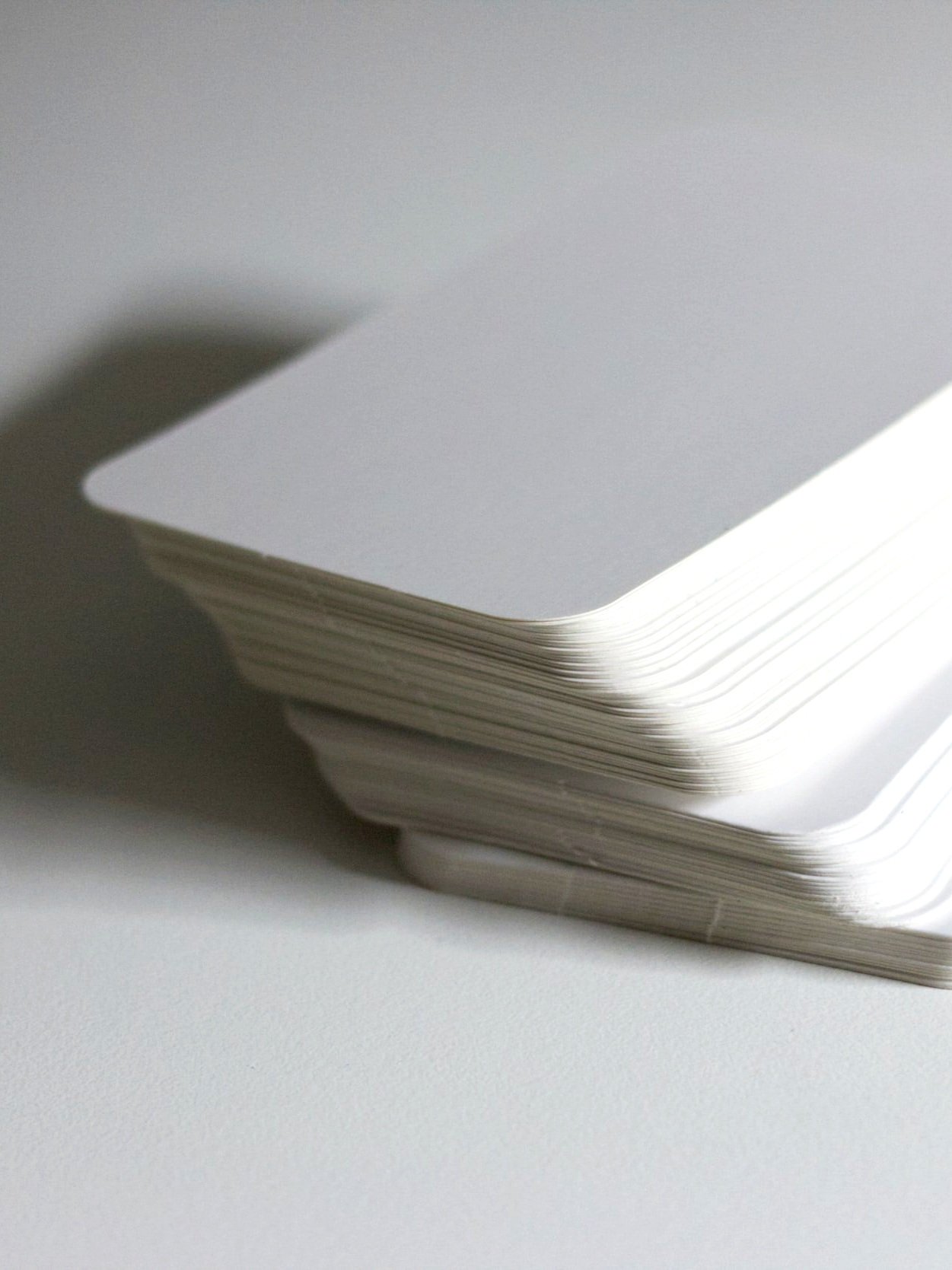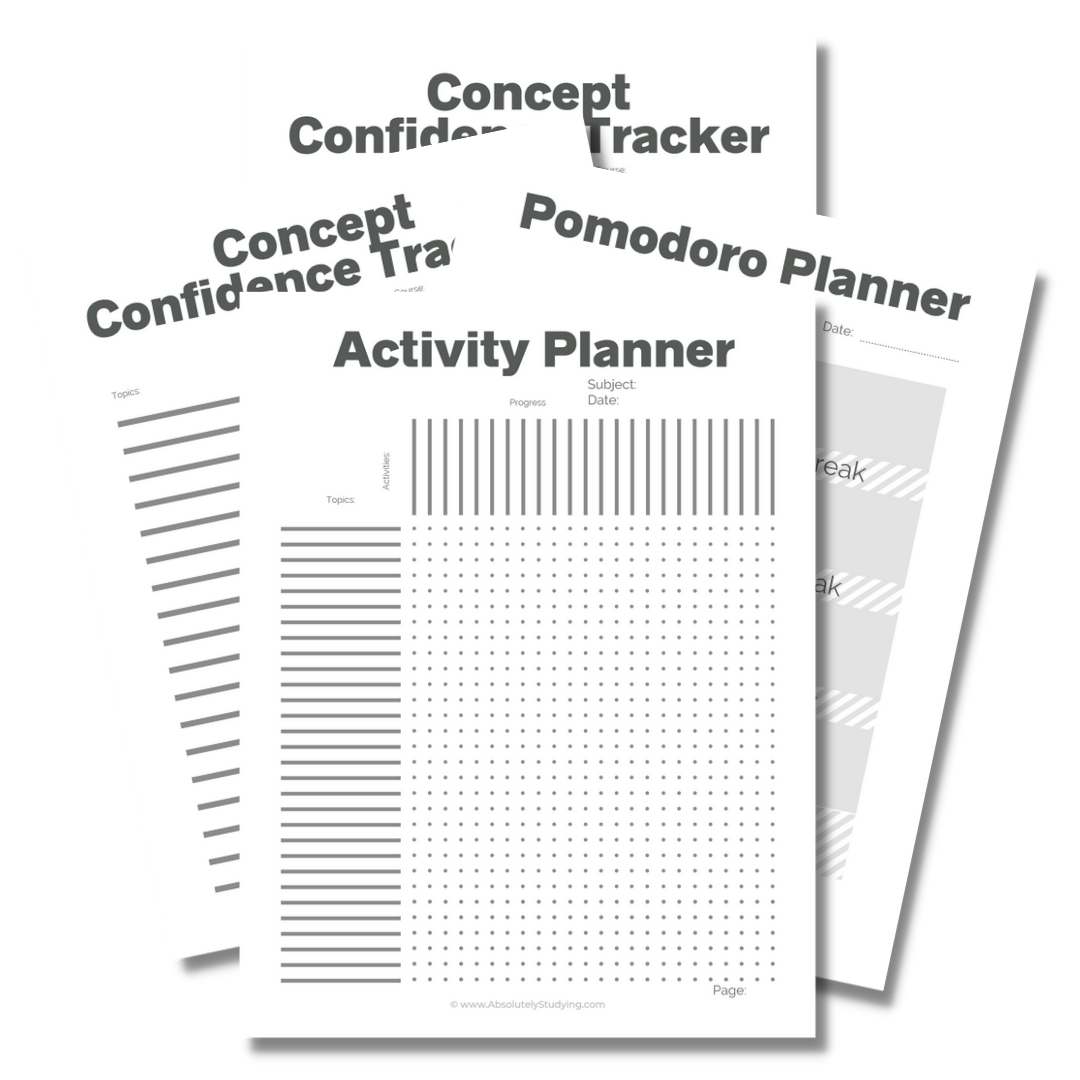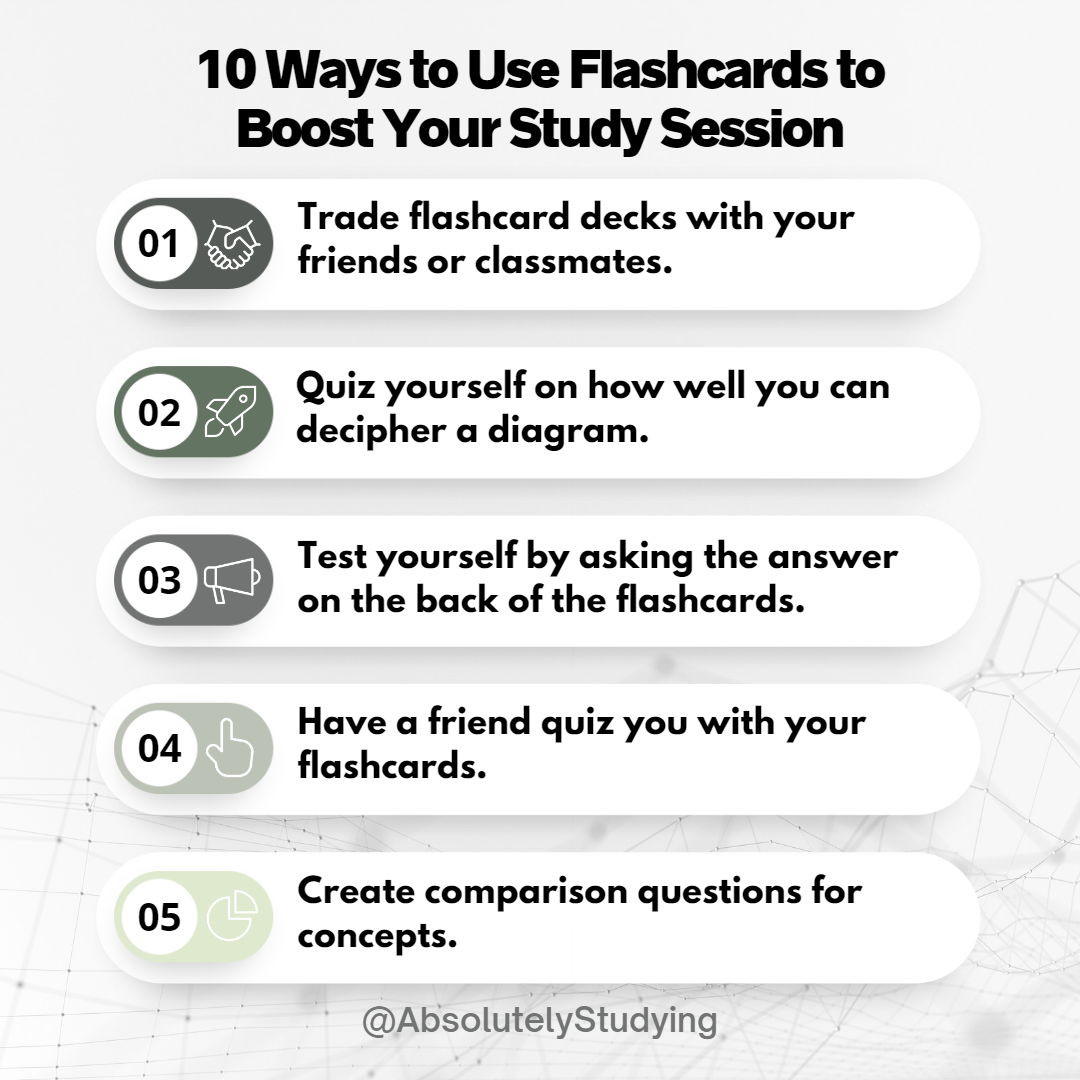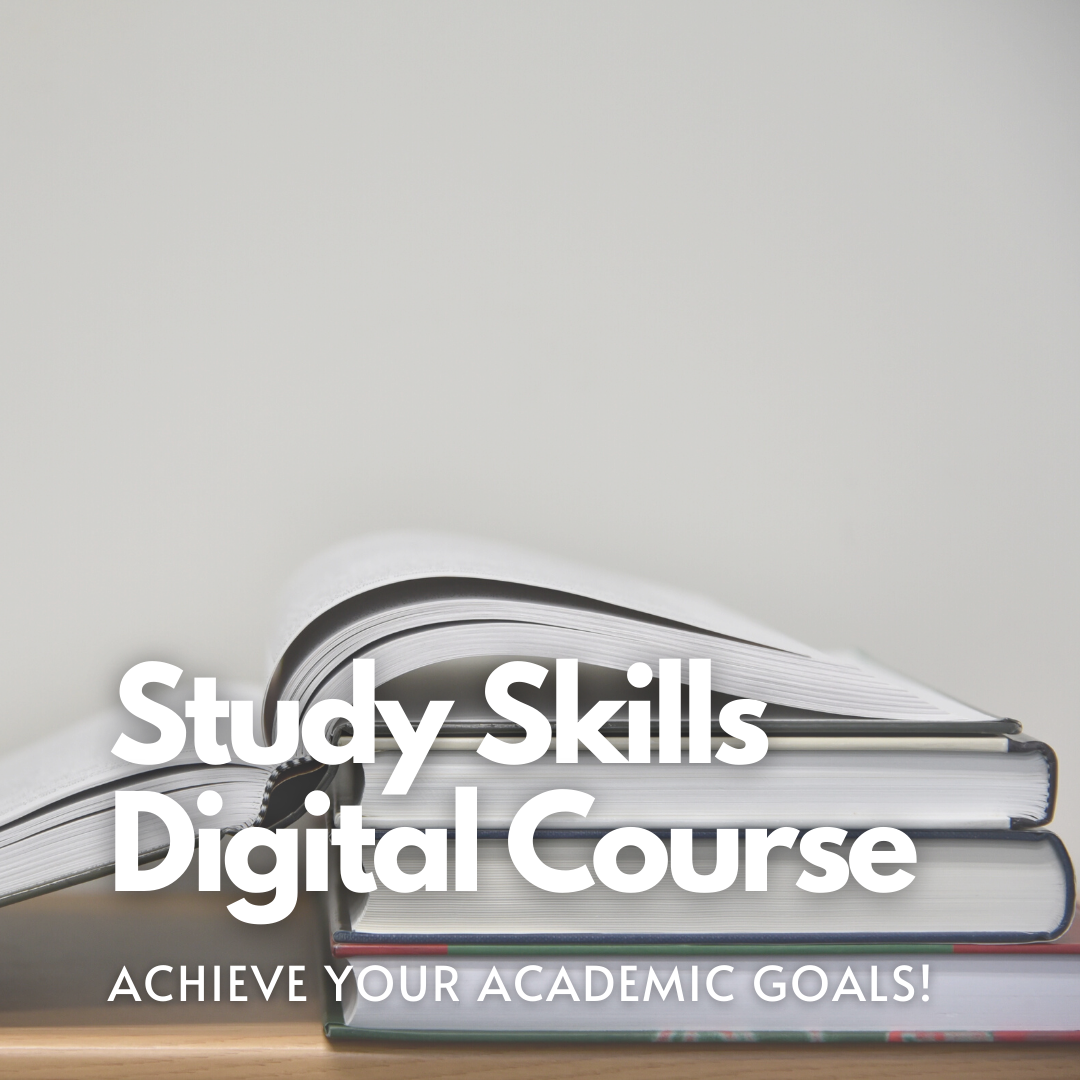Master Your Study Sessions with These Flashcard Techniques
Master Your Study Sessions with These Flashcard Techniques
Flashcards are an incredibly effective study tool, but are they better than notes?
Everything you need for the semester you want!
This bundle includes:
The Syllabus Study Planner
The Pomodoro Planner
A Confidence Tracker
A Q&A planner
The “Get Organized Checklist”
and more!
This workbook is full of super useful resources that can be applied to every aspect of your day.
* Disclaimer * Some of the posted links are affiliate programs. By clicking these links, I may receive monetary compensation. This will not alter the price or change the buyer’s experience.
Flashcards are a staple for the savvy student. They are the best way to quiz yourself in a pinch or fit in a quick study session on a busy day. One of the best things about flashcards is that they are highly customizable and can be used anywhere.
These study tools are incredibly portable, so they are terrific on the go. They come in endless forms, from physical cards that you make yourself all the way to pre-programmed digital ones. They require little to no setup and do not cause a mess.
Flashcards have many uses; if used correctly, they are an excellent tool for memorizing the information you need. Understandably, they can get boring after a while. Sometimes you just need to mix it up.
There are many ways to use flashcards. Let’s discuss 10 fantastic ways to use flashcards to boost your study session. These strategies will help you to improve recall and create memory cues that you can rely on during test time. Flashcards are highly effective, but a lot of students overlook them. This is probably because the flexibility and versatility of these tools are often ignored.
Ready to supercharge your study sessions with flashcards? Download our free study planner and activity tracker now to create a winning study strategy for every class. Don't miss out on acing your exams! Get started today.
Free Study Guide Template
Everything you need for the semester you want!
Understanding Flashcards and Their Effectiveness
Flashcards are small cue-style cards used to test your memory and recall on a given topic. They are usually on 5 x 3-inch rectangular pieces of cardstock. Several programs can also help you create flashcards in a digital format for your phone or tablet. On one side of the card, there is generally a prompt or a question, while the other side holds the answer.
When using flashcards, you usually shuffle through reading the question and testing yourself by answering it from memory. This is important in many areas of study because it tests the strength of your memory associated with each concept and how fast you can answer it.
Are Flashcards better than notes? To answer simply, yes. Flashcards focus on active recall. This means you are not only testing if you remember the material under study but can also retrieve it coherently.
The purpose is not to memorize the answers verbatim but to be able to explain a concept or answer a question when asked. It also helps to test how quickly and confidently the information can be retrieved, which is imperative during test time.
Creating Effective Flashcards: A Step-by-Step Guide
Making your own flashcards, rather than purchasing premade ones, is an excellent study activity. This gives you time to customize each card to your specific learning style. It also gives you the ability to control the focus of the deck. You can customize flashcard decks to go in-depth and add more questions about concepts you don’t yet understand or struggle with. You can also go lighter on the material you are confident with or set these cards aside as you progress.
Use class and textbook notes as a guide when creating your flashcards. After completing the final copy of your notes, go through and pull all the important terms and points from them.
This usually includes:
vocabulary or terminology,
theories or hypotheses,
names,
dates,
places,
and most importantly, essential points
Create a deck of flashcards specific to your study needs. This will make what you quiz yourself on directly related to what you study in that class. What you focused on in your notes and took away from your textbook is what you will concentrate on.
By creating your deck of cards directly from your textbook, you will be able to design a study strategy focused on your strength and confidence level with the material.
10 Proven Techniques to Enhance Study Sessions with Flashcards
Adding flashcards is a fun, active recall activity that you can use to boost nearly any study session. Flashcards are an opportunity to step away from your desk and study anywhere. You can use them on the go, with friends, and even with a study group; the possibilities are nearly endless.
With flashcards, you can really have fun with your study activities. You can quiz yourself and do something light, or set a timer and put the pressure on. There is a ton of flexibility in how you can use them, and that is precisely what I want to talk about today, so let’s dive in.
Quiz yourself by asking the questions on the front of the flashcards.
Now that we have your own personalized deck of flashcards created, we can focus on the activities. The traditional method of using flashcards is adding questions on the face of the card with the answer on the back. This is a solid strategy.
Quizzing yourself in this way is a consistent and dependable active recall activity. You are actively testing your ability to retrieve and relay the information you have been studying in real-time. By posing the question, you are assessing the mental associations you have created to retrieve the material from your memory stores. This is one of the best ways to study for tests or exams.
Make sure you create several cards for each fact. Create cards with different phrasing of the questions and various aspects of each concept. The best way to prepare for exam time is to anticipate and answer problems in several distinct ways. You are putting yourself directly in your professor’s shoes when you rephrase these questions in several ways. Try to get inside their mind and figure out how they will ask you the questions. This will help you prepare for anything that could be on the exam.
Test yourself by asking the answer on the back of the flashcards.
Once you have memorized a particular set of flashcards, turn them over and try quizzing yourself by reading the solution. Questioning yourself Jeopardy-style is a brilliant way to ensure you can understand and work with the concepts rather than just committing the deck of cards to memory.
While it’s essential to have a strong understanding of the answer to any question. Flipping over the deck and trying to guess the question from the answer will ensure that the mental associations work both ways. This is another exercise to reinforce those pathways. Being able to connect the question starting from the information given in the answer is going to make sure that this road does not lead only one way.
Can you figure out which term to use from its definition? You will never know if you don’t flip the card over and quiz yourself on it.
Have a friend quiz you with your Flashcards.
If you have been following me for a while, you already know I’m not a huge fan of study groups. Study groups can often be a wasteland for productivity. It can be a full-time job just to keep all members focused. Generally, one or two students are usually responsible for the workload of the entire group. Flashcards, however, can sometimes be an exception to this rule.
Having a friend or two quiz you puts you in the hot seat. With the spotlight on, you will feel more anxious than when you are just quizzing yourself. Familiarizing yourself with this discomfort early will help quell some test anxiety at exam time.
Having a friend test you can also discourage confirmation bias and sneaking a peek at a tricky question’s answer. This will force you to come up with a solution on the spot. Your friends are going to hold your feet to the fire. They will pull that answer out of you or possibly lead you to it. This means you won’t go straight to the answer, and even if you don’t get it right on the first try, you can still have some help finding your way to the correct response.
This is an excellent alternative for people who always study alone and silently. Just remember to stay focused and on task. Even if it’s between giggles with your bestie.
Try drawing cycles on your flashcards to make sure you memorize the sequence of specific processes.
Try drawing out the sequence for dynamic events and quiz yourself on the labelling. Being able to visually see events and label them from memory can be really helpful at test time. Re-creating these processes without reference is useful to be able to sufficiently elaborate answers on a test.
Simply draw the cycle on the front of the card with numbered labels on the back. When you come to that flashcard, name the specific location for as many points as possible.
Cycles, events, and processes, often must be remembered in order. You will never know if you have memorized your notes in the correct order by simply reviewing them. The only way to see if you can recall it is by actually testing yourself. Flashcards give you that opportunity.
Quiz yourself on how well you can decipher a diagram.
Diagrams are vital to the visual learner. You can often describe ideas much more precisely in pictures than in words. If you have illustrations in your notes to help convey your ideas, add them to your flashcards. Number any missing labels and add them to the back so you can quiz yourself on the diagram’s content and the illustration itself.
You can also use these diagrams as prompts for a brain dump. When you come across these illustrations, write down everything you can remember about it. Take the time to describe anything you can place in these diagrams, and then check what you missed on the back.
Flashcards don’t need to be stuffy or strictly tied to words and phrases. You can use any diagram to convey any piece of information. Use it to define terminology. For example, draw a muscle with the bone it inserts on, attaches to, and its antagonistic muscle. Put all of these critical landmarks on the back of the card. Now when you flip through your flashcards, you can quiz yourself and how well you know this particular piece of anatomy.
Flashcards are made for terminology.
Understanding terminology is imperative to learning the language of the course. New words should be immediately added to the flashcards deck so you can quiz yourself on their definitions.
Being able to accurately define and use these words is imperative to being able to accurately relay your answers. Using the terminology when you explain yourself on your exam indicates to the professor that you know the language of the course and can use it fluently. This will prove that you have a solid understanding of the material.
Create comparison questions for concepts.
Questions comparing both similar and different concepts are great for flashcards. Comparing theories is a fantastic way to force you to think critically about a topic. Analyzing ideas and how they relate to each other helps to display your knowledge of a subject. Creating and linking mental associations is also terrific for cementing your understanding and ease of recall.
One very effective way to prove your understanding of a concept is to be able to clearly compare it against another similar concept. This only works when you can clearly define specific points that are similar and different and how each attribute contributes to the differences or similarities in that concept. Professors love answers like this because it shows off just how much you’ve taken in during this class and how confident you are in the material.
Trade flashcard decks with friends and classmates.
Once you have exhausted your own flashcards, trade decks with your friends. This will allow you to quiz yourself on the same information from a different viewpoint. Your friends will have diverse perspectives on the information and another way of phrasing the prompts. This will help prepare you for exam time when you have no control over which questions you are asked or how.
You might also find that your classmates have focused on different topics than you did. This will expose you to information that you might have initially thought irrelevant. It’s always fascinating to see what was important from the perspective of your colleagues. It’s even better to see how they phrased questions compared to yours. Both are significant benefits.
When you trade flashcards, you hold your mental associations up to someone else’s perspective of the information. This will test them to see if they are as strong as you believe they are. Can they hold up to unfamiliar questions and someone else’s way of thinking? Are the pathways strong enough to still link you to the correct information and retrieve it on these newly rephrased questions?
Create a deck of flashcards specifically for brain dumps.
Brain dumps are a great way to routinely test how much information you can recall on demand. With this exercise, you sit down with a blank piece of paper, set a timer, and simply write out everything you can remember on any given topic. I often suggest doing this weekly with at least one or two concepts.
Keeping a running list in your notes of diagrams, terminology, or concepts you can use as prompts will help you keep track of material to quiz yourself with. This way, you are fresh and do not have a sneak peek at your notes before the brain dump.
Alternatively, you can use a deck of flashcards specifically for this process. Just shuffle your deck and pick out a few random cards. Using the questions or the selected flashcards, proceed to your brain dump as usual.
Choosing a concept in this way will make the selection more random. There will not be any biases that influence you to select material that you feel more comfortable with, reinforcing mental association pathways that might already be well established. You will have a better chance of choosing topics that are less familiar and thus need more attention.
Study Skills Digital Course
Learn how to create a stress-free, comprehensive strategy!
Quiz yourself out loud for more memory cues.
The more senses you involve in your study routines, the more cemented the information will be. Quizzing yourself out loud will add extra levels of memorization, and reading the card aloud adds both production and auditory levels of understanding. Mixing pictures, charts, and words will change the visual cues.
Keeping all your senses engaged in the study session will help to cement the information and aid in the ease of recall. This all translates to easier retrieval of the material when tested. Ultimately that is what’s essential.
You sit in the lecture hall and read your textbooks, preparing for your final exam. You can study this information over and over. Still, if you cannot retrieve it quickly when the stakes are high, and the exam is in front of you, then all of this doesn’t really matter.
While writing two to three-hour exams is not always the best way to demonstrate your knowledge or understanding of a topic, it’s what we have to work with for now. Practicing testing and recall will be the best preparation for this gruelling session. Flashcards are a fun activity to help you ease through the transition from learning the material to acing that exam.
Transform Your Study Routine with the Productivity Booster Pack
Embark on a journey of academic excellence and personal growth with the Productivity Booster Pack, a comprehensive toolkit designed to elevate your productivity and streamline your study sessions. Whether you're navigating the complexities of post-secondary education or balancing personal and academic life, this pack is your companion toward achieving your goals with confidence and clarity.
Why Invest in the Productivity Booster Pack?
Customized Learning: Tailored to fit diverse learning styles, this pack offers a range of tools to suit your unique study habits and academic needs, empowering you to learn more effectively.
Holistic Approach: Beyond academic success, the pack addresses time management, goal setting, and personal well-being, ensuring a balanced approach to your educational journey.
Empathy-Driven Design: Created from personal experiences and challenges in academia, this pack is imbued with understanding and strategies that resonate with students' real-life hurdles.
The Productivity Booster Pack is not just a set of tools—it's a catalyst for change designed to transform your study habits, boost your productivity, and inspire a journey of continuous learning and improvement. Embrace this opportunity to turn your academic aspirations into achievements.
Get Your Productivity Booster Pack now and start a transformative journey that transcends beyond the classroom, equipping you with skills for lifelong success.
Flashcards are more than just a study aid; they're a dynamic tool that injects energy and effectiveness into your learning process. By incorporating flashcards into your study sessions, you're not just breaking the monotony of traditional studying methods; you're engaging in an active recall exercise that sharpens your memory and enhances your test performance in real time.
Transform the way you learn by integrating flashcards into your Pomodoro study blocks. This not only diversifies your study routine but also maximizes your retention and recall, turning each study session into a powerful step toward academic success. With flashcards, you're not just passively absorbing information; you're actively interacting with it, forging stronger mental associations that stay with you when it counts.
Don't let your study sessions become a grind of textbooks and endless notes. Spice up your learning with flashcards and witness a significant boost in your memory retention and test scores. But why stop there? Elevate your entire study strategy with our free Study Guide Template. Tailored to help you craft a personalized and effective study plan, this template is your roadmap to confidence and success in your academic journey.
Embark on a path to academic excellence with a study strategy that's as engaging as it is effective. Grab your free Study Guide Template today and start building a study routine that not only prepares you for your exams but also ignites a lifelong passion for learning.
Download Your Free Study Guide Template here and transform your study sessions from mundane to monumental.
I would like to be transparent so that there are no misunderstandings. As an affiliate, I may earn a small commission from any products linked in this post. This is not a sponsored post, and I was not asked to recommend these products. These are products that I genuinely love and want to share with my audience.















